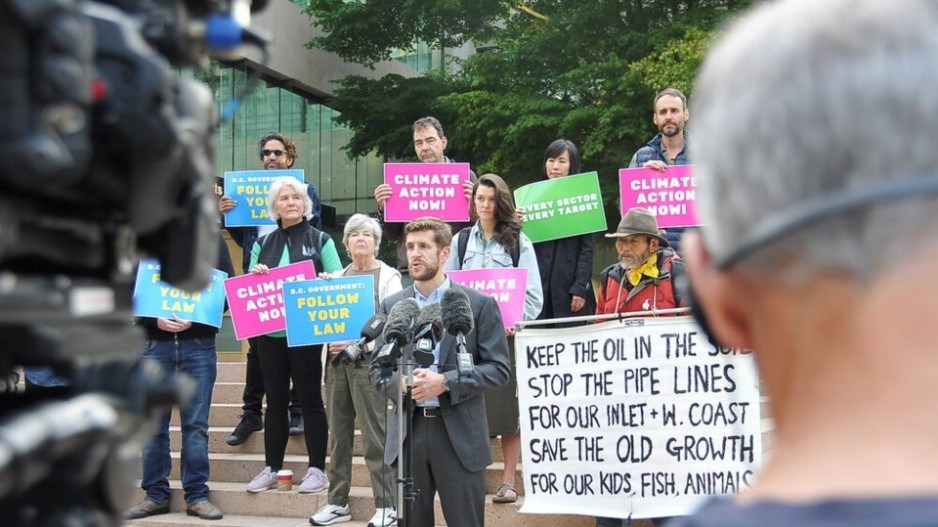The province did not break its own climate change accountability laws, ruled a B.C. Supreme Court judge in a decision released Tuesday.
In a request for judicial review, heard at a Vancouver Supreme Court in October 2022, lawyers for Sierra Club BC argued that the government’s latest report on how it would achieve its emission reduction targets didn’t go far enough, and essentially amounted to a “vague plan to make a plan.”
“We are pleased with the court's ruling,” said a spokesperson for the Ministry of Environment and Climate Change Strategy.
“B.C. has some of the strongest climate accountability measures in Canada, ensuring credibility and transparency.”
The case turned on a key piece of legislation known as the Climate Accountability Act, which is meant to provide transparency around the government's emission reduction targets.
Lawyers for the Sierra Club said they were disappointed by the ruling, but buoyed by the fact that the judge affirmed the government can be taken to court over its climate transparency laws.
“The B.C. Climate Change Accountability Act was brought in with great fanfare by the government because it was supposed to put an end to this long history of missed targets by ensuring greater accountability and transparency around climate — and it clearly hasn't done that,” Alan Andrews, Ecojustice's climate director, said.
“It isn’t fit for purpose.”
'Nothing nefarious going on here,' says government lawyer
In 2021, the Ministry of the Environment and Climate Change Strategy released plans to reduce emissions in the province to 40 per cent below 2007 levels by 2030. It said the province would achieve that goal through two climate plans: CleanBC would get the province 40 per cent of the way there, and Roadmap to 2030 would make up the difference.
But lawyers for the Sierra Club argued the province has failed to do the same for its emission reduction targets in 2025, 2040 and 2050.
As Sierra Club lawyer Andhra Azevedo put it to Justice Jasvinder Basran in October 2022, “Essentially, they’re saying, ‘trust us.’”
Sierra Club lawyers also claimed the B.C. government has failed to spell out how it will reach its 2030 emission reduction targets in the oil and gas sector, leading to a plan that “undermines the intent to hit separate sectoral targets” and “makes it impossible to gauge what the minister is doing to reduce emissions,” Azevedo told the court.
She pointed to big fossil fuel projects like LNG Canada, slated to be the largest natural gas project in the province once it comes online in 2025, and which could account for up to 30 per cent of the province’s emissions by 2050.
“Decisions made now can lock in emissions, and will not just impact the ability to reach the 2030 target, but also those longer-term targets,” Azevedo told the court.
Without detailed reporting requirements, Azevedo said British Columbians would be “left in the dark about whether the province is about to miss another target.”
In response, B.C. Ministry of Justice lawyer David Cowie cast the call for a detailed accounting of how the government would meet its targets as a “technical requirement” better argued on the floor of the legislature than in a courtroom.
The government lawyer said emission reduction targets and the plans to achieve them are tabled in the legislature, making the climate policy inherently political, and not something that should be argued before a judge.
Ultimately, submitted Cowie, the Minister of the Environment and Climate Change Strategy is not legally required to give a detailed account on how B.C. would hit its 2025, 2040 and 2050 targets — and that omitting such details was within the minister's "reasonable discretion."
“There's nothing nefarious going on here,” Cowie told the court in October.
Better data could help reach emission targets, but not legally required, rules judge
In his ruling, Basran found challenges to the act can be heard in a court of law, but that the ministry has no legal requirement to provide the kind of detailed emission reduction plans Sierra Club BC’s lawyers called for.
The Climate Accountability Act, wrote Basran, only requires detailed reporting on greenhouse gas emissions for the current year and two subsequent years.
Basran added information contained in the Roadmap shows progress made towards B.C.'s 2030 target, specifically, that “based on currently enacted initiatives, this target, like all previously established targets, will probably not be met.”
If the minister wanted to publicly release information on progress toward its 2040 and 2050 targets — as the Sierra Club requested — he would have to provide “quantitative data” on how the province anticipates it will reduce its emissions, wrote the judge.
Such information may help B.C. meet its emission reduction goals and finally break the province out of its “consistent history of missing its targets,” said Basran. But that type of reporting “is simply not required,” he added.
Andrews said the lawyers at Ecojustice stand by their interpretation of the act. He said they are considering the judgment carefully and will decide over the next 30 days whether they will appeal the decision.
In the meantime, he called on Premier David Eby to strengthen the legislation so that it does what it was originally intended to do: “to provide that transparency and accountability so that British Columbians can know whether B.C. is on track to meet its climate targets, and if not, hold government's feet to the fire.”
“Regardless of whether we as lawyers think this information is required under law, British Columbians deserve that information,” Andrews added.
“They have a right to know whether their government has a plan to reach these climate targets that they have set for themselves.”




